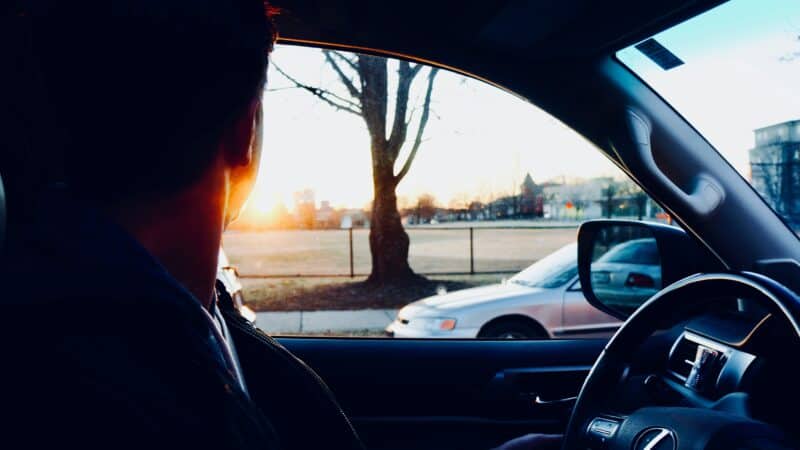Driving under the influence of marijuana remains illegal in all 50 U.S. states, even with its legalization in some states. A "marijuana DUI" carries hefty penalties. While the impact of marijuana on driving abilities and accident risks is debatable, it can result in slower reaction times and reduced peripheral vision.
Driving Under Influence Of Marijuana
However, drivers experiencing a delirious high on narcotic substances are generally more cautious while others may disregard consequences and drive erratically.
The recent arrest of Pittsburgh Steelers running back Le'Veon Bell for driving under the influence of marijuana raises awareness of a common misconception among pot smokers. Bell admitted to the arresting officer that he was unaware of the possibility of a DUI while being high.

Driving high on weed in Texas. Photo by Jan-Christopher Sierks on Unsplash
What does it mean to be driving under the influence of marijuana, and what are the marijuana DUI consequences in the state of Texas?
''Smoking marijuana has a very negative effect on your ability to operate a motor vehicle,'' said Gil Kerlikowske, the former director of the White House Office of National Drug Control Policy. "It's quite dangerous to you, your passengers, and others on the road.''
Houston-based criminal defense attorney Mark Thiessen writes on his blog, "Weed DWIs are just as severe as regular DWIs in Texas - in fact, they're the same charge. Weed DWIs can be more complicated than alcohol-related DWIs because there is no legal limit for driving high!"
Thiessen further writes, "You can drink two beers, Thiessen explains, take a breathalyzer test that reads .04, and be on your way. But if you take two puffs and a police officer suspects that you are stoned, they are not only incapable of verifying your relative sobriety but there is no legal precedent for it."
Additionally, Thiessen also states on his blog that if you are caught driving high while in possession of weed in Texas, you can likely kiss that diversion program or cite-and-release goodbye. Whether you have two grams or two ounces of marijuana on you, if you're driving high, Texas police will likely charge you with DWI and drug possession - so be extra careful if you're traveling with a bag.
Texas Legalized Hemp
In 2019, Texas legalized hemp, but not marijuana, the Texas Tribune reported. The new law led to confusion about which marijuana products are legal in Texas. Meanwhile, support for legalizing the drug remains high in polling, and other cannabis-derived products like delta-8 have emerged.
Texas currently only allows low-level THC medical marijuana, but like most of the country, has also legalized hemp production.
The 2018 U.S. Farm Bill made it legal to grow hemp in the country as long as it contains no more than 0.3% delta 9 THC, the psychoactive compound in cannabis, on a dry weight basis.
The irony here is despite these legal gains Texas still criminalizes marijuana 24-7.

Police pull over driver. Photo by Bailey Hall on Unsplash
Texas Marijuana DUI laws
Driving under the influence of marijuana in Texas can result in a DWI charge. Such a consequence involving marijuana is deemed illegal in the state. Even in jurisdictions where recreational use of marijuana has been legalized, criminal charges can ensue if a person operates a vehicle while under the influence of the substance. The underlying reason for facing a DWI is that the acronym "DWI" encompasses more than just intoxication through alcohol, as the "I" stands for "intoxicated."
Driving High on Weed in Texas
Under Texas Penal Code § 49.01, a person is considered intoxicated when their normal faculties are impaired by any substance. That includes marijuana.
When Marijuana Affects Drivers
As previously mentioned, intoxication occurs when an individual's cognitive or physical abilities are impaired due to the ingestion of a substance. In the case of marijuana consumption, the substance traverses the person's body and reaches the brain.
The chemical reaction that ensues can induce various outcomes, encompassing but not limited to:
- Euphoria
- Relaxation
- Disorientation
- Altered sense of time
- Impaired body movement
Impaired bodily functions can diminish someone's ability to exercise sound judgment, maintain coordination, and react swiftly - all of which are crucial for safe driving. Consequently, when these faculties are compromised and someone chooses to operate a vehicle, their actions can be considered a violation of Texas's DWI law, potentially resulting in arrest and criminal charges.
Texas does not have a separate statute for marijuana DWIs. Therefore, the same laws for alcohol-related offenses also apply to those involving cannabis. Thus, the penalties for a marijuana DWI are the same as those for an alcohol DWI.
Penalties For Marijuana DWI
2 ounces Class B misdemeanor $2,000 Fine and Up to 180 days in jail
2 - 4 ounces Class A misdemeanor$4,000 Fine, Up to 1 year in jail
4 ounces -5 pounds State jail felony $10,000 180 days - 2 years
5 - 50 pounds Third-degree felony $10,000, 2 - 10 years in Texas Prison
50 - 2,000 pounds Second-degree felony $10,000, 2 - 20 years in prison
2000 pounds first-degree felony $50,000, 5 years - life in prison
Why Detecting Marijuana Impairment is Challenging
Detecting marijuana impairment is challenging because the techniques used to identify alcohol levels and impairment are not as effective for marijuana as should be.
For example, Standardized Field Sobriety Tests (SFSTs) determine alcohol impairment but not marijuana impairment. A study by RTI International confirmed that SFSTs do not accurately indicate marijuana intoxication. Roadside breath tests cannot measure THC levels, although some labs are developing devices for this purpose. Even if THC levels could be measured, other issues arise, which are detailed in this article.
In most DWI cases Texas law enforcement relies on chemical tests, not just SFST or roadside breath tests. Yet the blood and urine analyses may not hold the same weight in a marijuana-related DWI as in an alcohol-related DWI. Alcohol is quickly absorbed and leaves the body, while marijuana is stored in fatty tissues for longer.
Marijuana can be detected in a person's system for days or weeks. A chemical test can show the presence of marijuana but not when it was used, so the driver may not have been under the influence at the time of the offense. The state must prove intoxication while driving, not just marijuana in the system.
THC in a person's system doesn't necessarily mean impairment, as per RTI researchers. THC levels aren't a reliable indicator of intoxication, so Texas and other states lack per se laws for marijuana-related DWIs. For alcohol-related offenses, a BAC of 0.08 or higher is considered intoxication.
Due to these challenges, a Drug Recognition Expert (DRE) evaluates the driver through tests like interviews and eye exams to determine intoxication.
DUI laws for marijuana vary by state, similar to the issue of legalizing marijuana. Some states have a "per se" DUI, where any level of marijuana can lead to an arrest. Marijuana testing measures metabolites that may stay in the body for days, weeks, or months.
This poses challenges for states that legalized marijuana, as even recent medical use can be detected. In most states, judges have discretion for marijuana DUI sentencing. First offenses without aggravating circumstances may receive milder sentences, but each case varies. Marijuana DUI can be as serious as alcohol DUI in many jurisdictions and easier to prove in some states.
Check state laws to understand applicable rules.
Contributing reporter Clarence Walker can be reached at [email protected]
